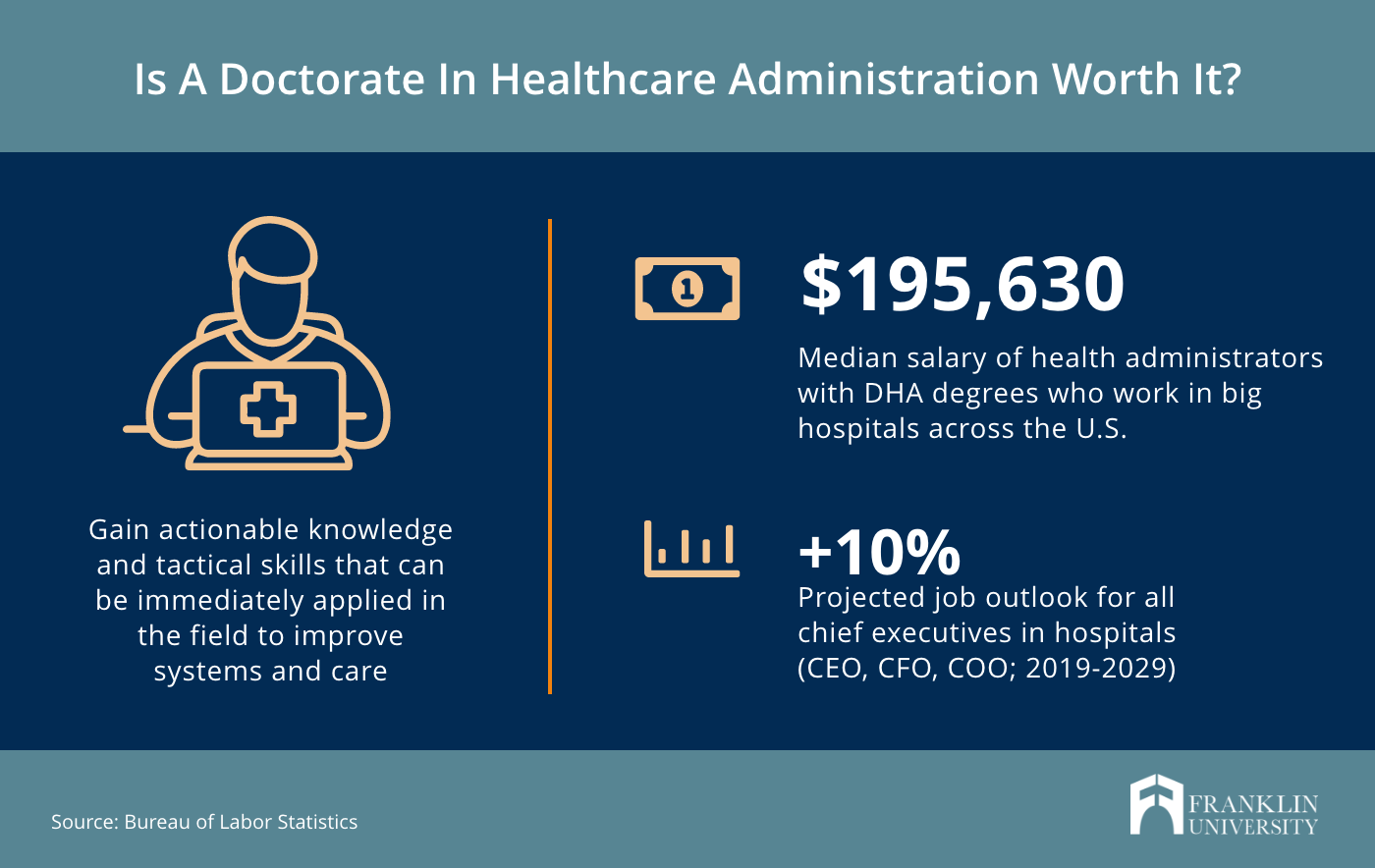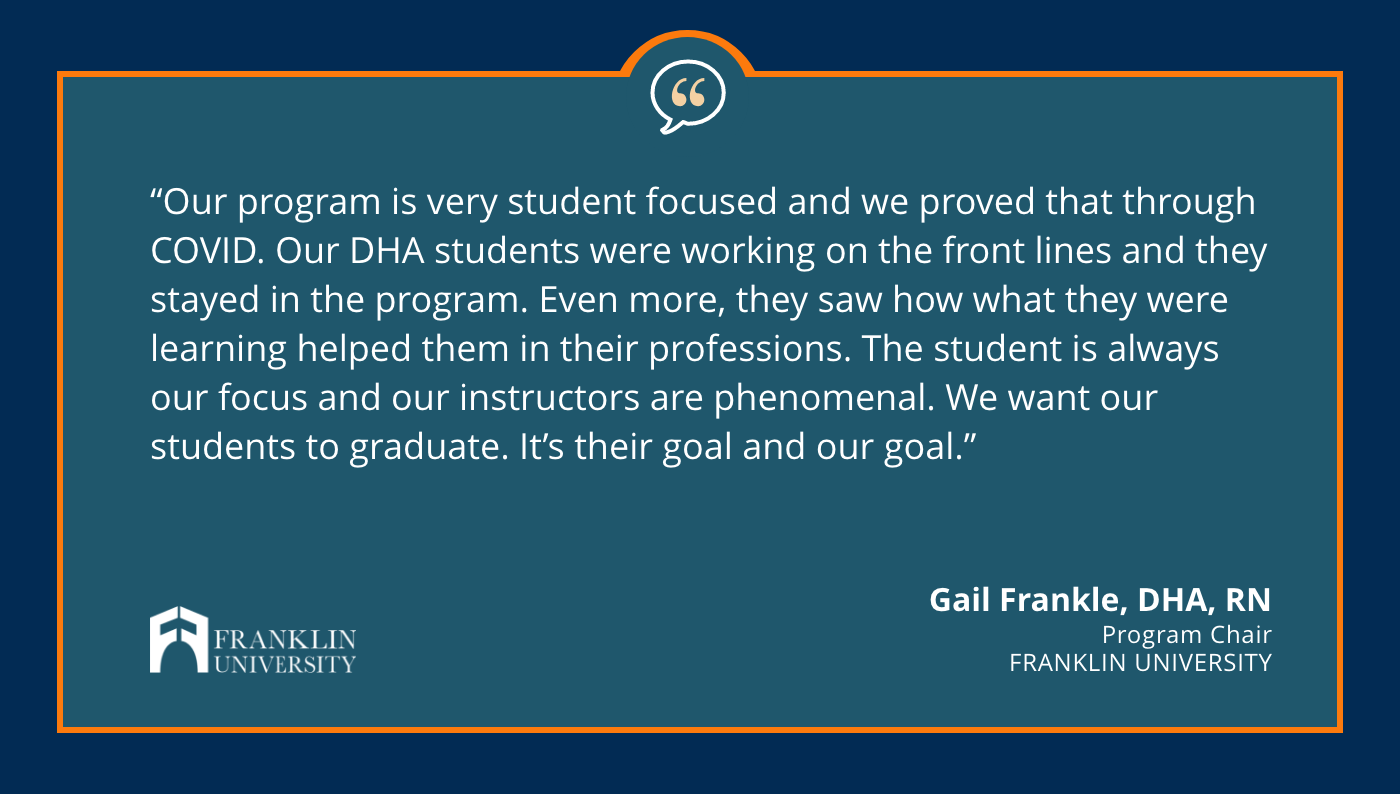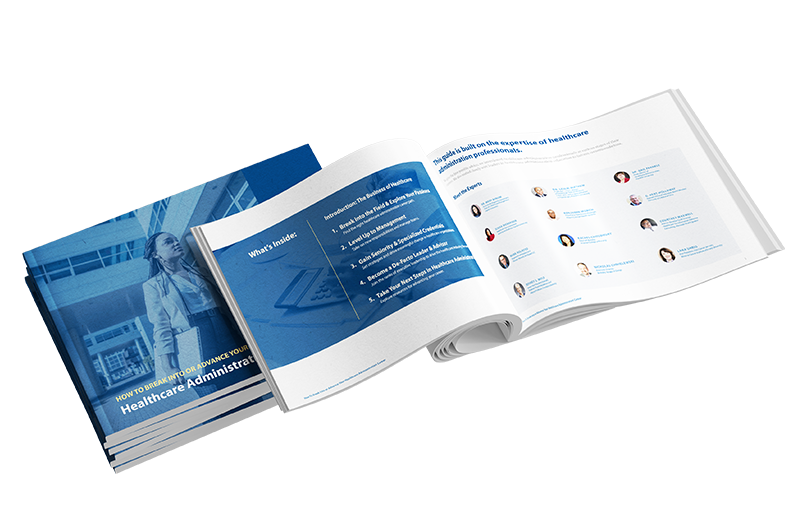Request Information
We're Sorry
There was an unexpected error with the form (your web browser was unable to retrieve some required data from our servers). This kind of error may occur if you have temporarily lost your internet connection. If you're able to verify that your internet connection is stable and the error persists, the Franklin University Help Desk is available to assist you at helpdesk@franklin.edu, 614.947.6682 (local), or 1.866.435.7006 (toll free).
Just a moment while we process your submission.

Is a Doctorate in Healthcare Administration Worth It?
Healthcare is taking on a new visionary role, eschewing tradition for more pioneering approaches to healthcare economics, policies, governance and quality. The people at the helm of this change are bringing forth fresh ideas supported by high-quality education, often in the form of a doctorate in healthcare administration (DHA). While earning an advanced degree is not necessary in some professions, it’s of utmost importance in healthcare.
“There are silos in healthcare and in the past we relied on business degrees to run healthcare, but we have found that some things just don’t fit the way we do business. People’s lives are at stake with what we do. A DHA brings all of the pieces together — regulatory, quality, social, community— so that as a leader, you can understand all of the perspectives.”
Gail Frankle, RN, DHA, program chair at Franklin University
A leader’s ability to properly address growing needs in patient care and policy change — particularly during these unprecedented times — requires knowledge and skill. With a DHA, healthcare professionals can firmly establish themselves as trusted authorities, lead a new era of care and increase their earning potentials.
What’s more, the healthcare industry is poised to grow, with the Bureau of Labor Statistics projecting the field will add roughly 2.3 million jobs between 2016 and 2026.
What is the difference between a DHA and a Ph.D.?
Healthcare professionals have a choice when pursuing an advanced degree; strive for a DHA or a Ph.D. While both degrees are research focused, a Ph.D. is best suited for people who are in pursuit of evidence and knowledge and want to work in research institutions and universities. In contrast, DHAs seek to apply evidence and knowledge to reach the upper ranks within healthcare systems and facilities. It’s a significant difference that prepares people for very different healthcare professions.
While a Ph.D. is more readily known across industries, a DHA is more specific in its application, making it extremely attractive to healthcare professionals and employers alike. At no other time in recent history have we seen a need for seasoned yet pragmatic leaders in healthcare who not only have knowledge, but can also apply that knowledge to improve or eliminate current-day challenges. A DHA degree gives leaders a better understanding of what it takes to make smart, well-informed healthcare decisions and the qualifications to earn high-profile and high-paying leadership positions.

"A Ph.D. is for someone who wants to do research all the time, and those who get a modified Ph.D. are more academic-research embedded. They aren’t necessarily in a clinical setting or a hospital,” said Frankle. “A DHA gives professionals the opportunity to impact the healthcare system and everything that touches it. You can be a C-suite leader, an administrator over a cancer center or other medical center, or even a manager or director over a set of departments. It elevates you into a leadership area where you’re working with teams.”
While it is possible for people who earn DHA degrees and Ph.D.s to cross-pollinate within the healthcare industry, with both finding opportunities to conduct research and teach, a DHA is the preferred choice for leadership positions and administrative roles in the healthcare industry.
Advance your career in Healthcare Administration while you advance patient care. Download your free career guide.
What career opportunities will a DHA provide?
The next generation of healthcare leaders are taking on new, expanded and visionary roles to advance healthcare. Earning a DHA creates opportunities to bring forth new ideas for policy, practice and patient improvements — and the timing couldn’t be better to pursue a degree.
Hospitals, medical and pharmaceutical companies, universities and much more are in need of professionals with advanced degrees to advocate out-of-the-box thinking and to lead an arena that can be unpredictable, challenging, and occasionally contentious.
Those who qualify can expect to advance their careers in the following professions.
- Hospital C-Suite: There are a variety of traditional and non-traditional roles within a hospital C-Suite, giving leaders the ability to make impactful and lasting change.
- Chief Executive Officer: Individuals are responsible for the operations of an entire hospital or medical facility and are the final decision-makers of all aspects of operations.
- Chief Patient Experience Officer: They impact and improve the relationship patients and their families have with a hospital or medical institution.
- Chief Innovation Officer: Leaders drive innovation and best-practices as they relate to the hospital environment.
- Health Information and Technology: This important role requires leaders to understand software and medical information technology to ensure the preservation and confidentiality of medical records.
- Nursing Home Administration: Similar to hospitals, nursing homes require leaders to manage finances, management and admissions.
- Healthcare Consultant: They work in a variety of settings and conduct research to identify problems and possible solutions.
With career advancement comes increased salaries. Figures from the Bureau of Labor Statistics reveal that medical and health services managers make an average of $104,280 annually. However, health administrators with DHA degrees who work in big hospitals earn as much as $195,630 per year.
What does it take to earn a DHA?
Students pursuing a DHA degree should do their research to ensure the program they are applying for is committed to their success.
At Franklin University, students get 360-degree support, meaning they’ve taken a comprehensive and systematic approach to their online doctoral program, which includes team-based curriculum development, doctorally qualified faculty, and student-centered activities designed for working adults. Students also receive robust academic support from a variety of resources, including a graduate advisor, faculty advisor, research support and peers, as well as the Student Learning Center staff and Dissertation Committee members. With flexible online classes and most students earning their DHA in three years (including dissertation), Franklin University is a smart choice.

The Franklin University Difference
When choosing an institution to earn a DHA, it’s important to find a program that creates dynamic leaders who can understand the core technical aspects of quality research while also equipping students with sought-after skills such as communication and technology.
Franklin University’s applied doctorate program is a practical degree that enables both subject mastery and field application. That means students are prepared to research and communicate complex, organization-wide issues, design organizational strategies to improve healthcare operations and outcomes, and apply research to advance the field of healthcare administration.
Check out Franklin University’s DHA program, and confidently take the next step toward the career you’ve always wanted.





